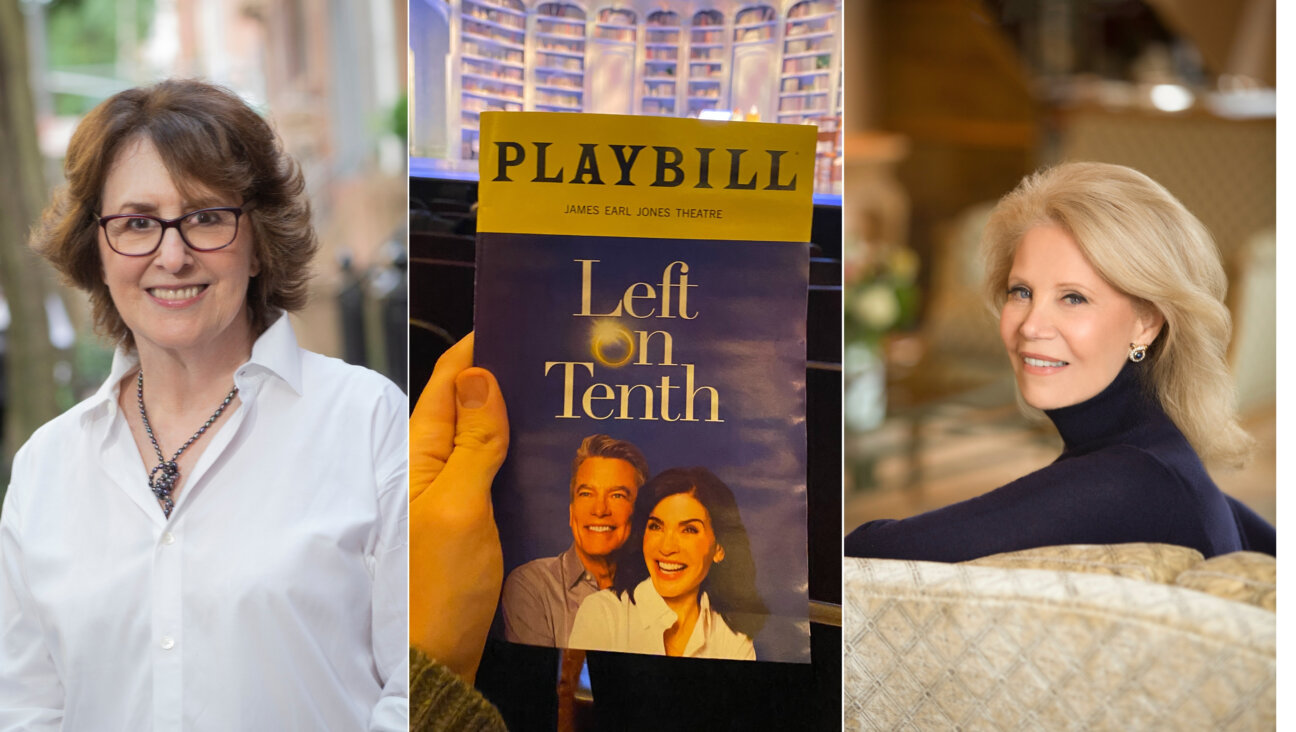Is there life after Zabar’s?

Zabars Image by Getty Images
So far so good.
I don’t have Covid. I’m working hard at it; following all the guidelines, but being super aware that life is different now.
Life changed dramatically for me in March when my friend Scott, store manager of Zabar’s, informed me that he didn’t want me working at Zabar’s until, as he put it, “this crazy shit ends.” He feared for my life and didn’t want to be complicit in exposing me to the virus. Instead of appreciating his genuine concern for my life, I thought, what gives him the right to decide how I should live out my remaining days? At almost 91, I cherish every day that I get out of bed in the morning. I asked Scott, what gave him the right to let me go and he said, “Because I love you and because I can.”
It was as though I was entering a new life, like something I loved had been suddenly taken away from me. How was I going to handle this new and difficult situation? I have had many difficult situations to deal with in my lifetime, most of them, no, all of them worse than this one, but I was feeling this one now.
I had the need to put into words just how I felt about the situation. I sat down at my computer and did just that. When I finished and reread what I had written, I felt that I wasn’t clear or thorough enough, so I went over the writing, made changes. I added, removed, trying to get my true feelings on paper. I put a lot of time into it (I had plenty of that, since I no longer had a job). When I finally finished writing about this situation, I thought that it was an interesting story.

Handle With Care: Len Berk slices through a side of Nova at Zabar’s delicatessan in Manhattan. Image by martyna starosta
Back in 2014 the Forward, then a print paper, put a picture of me and my salmon on the front page of their paper and wrote a story about me being the last Jewish lox slicer at Zabar’s. I thought I should send them this story. Not being a writer, I solicited the help of my two daughters, both of whom are authors. I submitted my story to the Forward and they published it in April.
It seemed like a new beginning. I thought that I might not be slicing lox for a while, but I began to think about writing about slicing lox. No one could stop me from doing that. Additionally, I could write about the many interesting experiences I’ve had on the job over the years. It was kind of mind-blowing in a way, not doing it but, instead, writing about doing it. I never thought of myself as a writer but I suspected now that I just might be. I discussed this new situation with my wife who had been a reading and writing teacher in the New York City school system, and she gave me some interesting advice. “Just tell the story into your computer and don’t leave out the details. See what happens.” It was an interesting thought — don’t write it; tell it.
At the beginning of the summer, it seemed as though New York City was experiencing a flattening of the virus curve. I had been in touch with guys at Zabar’s and was told that there had been only one employee out of 300 who had come down with Coronavirus and that occurred back in April. I had spoken to a few doctors, all of whom agreed that, under the then-current circumstances, if I wore a mask and practiced social distancing, there would be little risk in my returning to work. I thought about it and decided to attempt a return. So, in early July, I called Zabar’s, spoke to Scott and told him that my doctors felt that I could safely return to work if I wore a mask and practiced social distancing on the job.
He was very happy to hear the good news and said that he could bring about my return with a snap of his fingers and that my return presented no problem for him other than his consistent concern for my safety. He expressed concern for the feelings of my family and suggested that I discuss the matter with my son who is an M.D. My son agreed with the other doctors. Scott emailed and said that he would call me the next day. I anticipated his call but it never came.
I wondered why he hadn’t called me. Zabar’s wasn’t a “Mom and Pop” operation any more, where the boss called the shots. Now it was a multimillion dollar company with many departments; sales, shipping, purchasing, accounting and finance, human resources and more. Perhaps Scott was running into some problems bringing about my return. So, I called him. He wasn’t available to take the call. Instead, someone from Human Resources got on the phone.
I explained that I wanted to speak to Scott in connection with when I was to return to work. Her response, and the way it was delivered, was something that I will never forget: “Zabar’s isn’t hiring at this time,” she said — without feeling, without “I’m sorry,” without concern. The HR person knew who I was, that I had worked for Zabar’s for over 25 years, yet she spoke to me as if I were a person off the street, looking for a job. I said that my return had been arranged for and she said that I had been given me the wrong information, and that there was no room for me on the schedule. The call ended and I felt that I had been treated badly.
Scott finally called me. I didn’t take his call but emailed him instead.
“I want to apologize for not returning your call yesterday as I said I would,” I said. “Somehow I thought the conversation would be an unpleasant one for us both and neither of us needs that at this difficult time. Somehow I just wasn’t in the mood to hear, what I thought would be, the sugar-coated version of HR’s cold words: ‘We’re not hiring at this time.’ ‘There’s no place for you in the schedule.’ Anyway, it is what it is. All the best, Len”
“I’m sorry too,” he responded. “But we will talk at a later and hopefully better time.”
Faced with Zabar’s not taking me back at this time, for reasons that were not clear to me, even a bit mysterious I tried to put it aside and fill the working gap by writing more frequently. I read somewhere that Albert Einstein said, “In the midst of every crisis lies great opportunity” and I thought maybe writing could be my “great opportunity.”
What could I write about? For one thing, Zabar’s. There’s a lot to write about there. A few months later, I took inventory and noticed that I had published about 13 pieces. Seemed to me that was quite an accomplishment for a 91-year-old CPA/Lox Slicer and probably would not have happened were it not for the pandemic. So writing had become a new and significant part of my life, however, my desire to work behind the fish counter remained undiminished.

The Judges: Len Berk waves an American flag in the company of his fellow gourmets at the Taipei Food Festival. Image by Len Berk
During the early part of October, the boss, Saul Zabar, called me and said that if I still wanted to return to work, it was set. He had conferred with the powerful people and departments involved with my possible return, expressed his desire to allow for my return and apparently they had all acquiesced.
Saul and I have a lot in common. We both work for the same company; we’re both over 90 years old; he signs the company checks, I accept some; he tastes the caviar, I sell it; he listens to employee concerns, I provide some and we both love clams on the half shell . That’s what you call a basis for a relationship.
A week later, he called me again and said that, although he thought all was settled positively with respect to my return, there were certain unresolved matters and that he would keep working to resolve them. I couldn’t imagine what the problems were, but I had the right guy in my corner and I knew it was only a matter of time.
In October, New York seemed to be doing well, Covid-wise, with fewer and fewer cases. Things seemed to be falling into place and then, suddenly, toward the middle of the month, there appeared to be a spike in hospital admissions. My wife, who had previously agreed that it would be OK for me to return to work, changed her mind, and it was like the bottom fell out from beneath me. A few days passed, and I finally got the call from Saul that I had been waiting for: “I arranged everything; you can return to work this Thursday.”
I told him of the new circumstances, the Covid spike in New York City, and my wife’s reluctance regarding my return. He tried to help me with the problem, suggesting that I explain to her that Zabar’s, with over 300 employees, had only one case of the virus and that had occurred back in March. Furthermore, that the employee who got sick didn’t work in the main store, but rather in an auxiliary plant. He was eager to point out that store policy followed CDC guidelines; that all employees wear masks, practice social distancing and that customers are required to do the same.
He worked so hard to help me return because he understood how I felt. He was — and still is — in my position with respect to his vulnerability to Covid, but he chooses to work. He couldn’t be fired; he owns the place! I told him that I would attempt to get my wife to see things differently.
My wife, although impressed with the facts I presented, remained opposed to my return and I thought taking the risk for me was my right but I didn’t feel that I had the right to expose her — a tricky situation.
And so that’s where things stand right now. Absent consideration of my wife’s feelings, no question, I would return to work. I know the risks and I would take the chance. I could see all my buddies, shop (where else can one get the best pickled herring and chopped liver?), sit in “the chair” and so much more.
I’m sad, but one thing lifts my spirits. Both Saul and Scott have told me I can return any time I want. Looking forward to that time keeps me going. I hope when that time comes, and I expect it will, I’ll still be able to do the job; with love.
In the meantime, I will express my feelings with a poem:
To return or not to return, that is the question.
Whether ‘tis nobler in the mind to suffer the loss of co-workers and Nova salmon
Or to caress my knife and slice
And by so doing, serve the world.
To slice, to cut no more
And a slice, not an end be,
That the salmon laying on parchment
‘Tis a completion
An art to be shown.
To smoke, to cut to slice
Ay, there’s no rub
For in that slice of lox
Where marinades reside,
When we have separated the meat from the skin
Must give us pause.
There is a respect
That cures salmon to smoky goodness.
For who would bear the saltiness
And the trims of belly
The slicer’s rudeness
The pangs of slicers love
The delivery delay
The quiet insolence of refrigeration, and the spurns
That patient merit of the unworthy takes
When salmon it might its settlement make with bare blade.
To love the job,
To work each day with smile,
Who remains when the lovers of slicing retire?
The workers who slice not for love
But for remuneration only?
A sad day when artist be gone.
Who would burden bear?
To grunt and sweat above a weary knife,
But that the dread of something after slice,
That undiscovered darkness from whose bourn, no Sturgeon returns
Puzzles the will
And makes us rather bear those dark trims we have
That currents take to others we know not of?
Thus conscience does make thin slices for us all
And thus the native hue of resolution
Is suckled o’er with the pale cast of water
And enterprises of great fish collars and bone
With this regard their currents turn away
And the slicer moves on
Len Berk is the Forward’s lox columnist. He worked behind the counter at Zabar’s for 26 years.
A message from our Publisher & CEO Rachel Fishman Feddersen

I hope you appreciated this article. Before you go, I’d like to ask you to please support the Forward’s award-winning, nonprofit journalism so that we can be prepared for whatever news 2025 brings.
At a time when other newsrooms are closing or cutting back, the Forward has removed its paywall and invested additional resources to report on the ground from Israel and around the U.S. on the impact of the war, rising antisemitism and polarized discourse.
Readers like you make it all possible. Support our work by becoming a Forward Member and connect with our journalism and your community.
— Rachel Fishman Feddersen, Publisher and CEO























